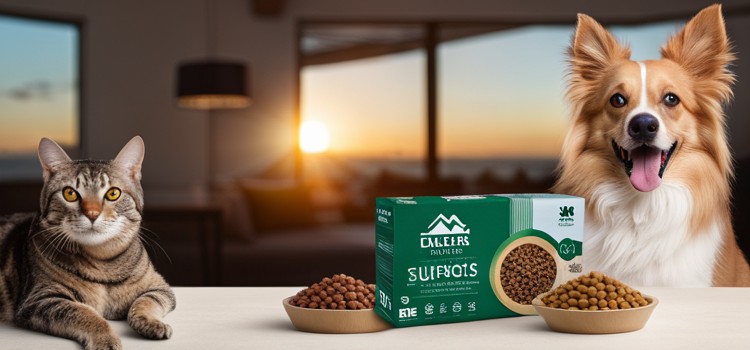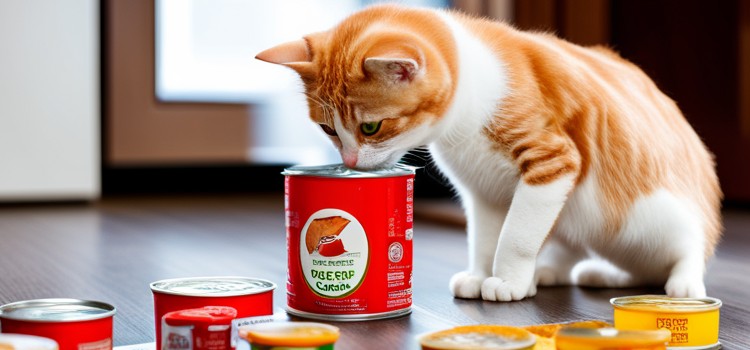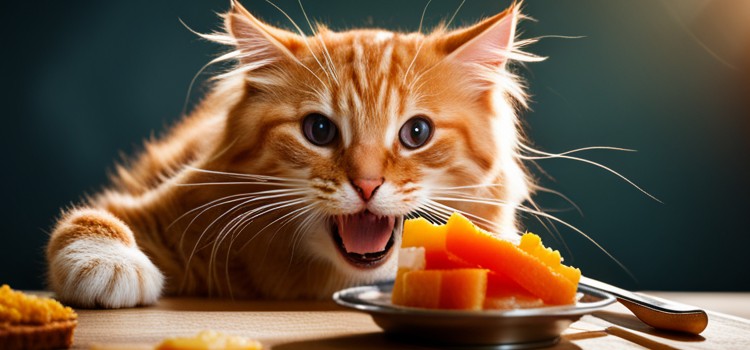As an Amazon Associate committed to the mission of improving the lives of our readers, Live-Clear.com receives a small commission from eligible purchases made through our affiliate links. This revenue enables us to keep producing insightful articles and other material.
Yes, cats can eat rotisserie chicken, but it’s important to remove the skin and bones first. Rotisserie chicken can make a delicious treat for cats, but it’s important to remember that their diet should mainly consist of commercial cat food.

While chicken is a great source of protein, the skin and bones can pose a choking hazard and cause digestive issues for cats. Additionally, any seasonings or spices on the chicken could upset their stomach. If you do decide to give your cat a small amount of plain, boneless, skinless rotisserie chicken as a treat, make sure to monitor them for any adverse reactions.
Introduction To Feline Dietary Needs
Explore the world of feline dietary needs by delving into whether rotisserie chicken is safe for cats. Discover the benefits and potential risks of feeding this popular human food to your furry friend. Understanding your cat’s nutritional requirements is essential for their overall health and well-being.
Essentials Of A Cat’s Diet
A cat’s diet should consist primarily of high-quality, commercially-prepared cat food that is specifically formulated to meet their nutritional needs. This ensures they receive the right balance of proteins, fats, carbohydrates, vitamins, and minerals. Feeding them a complete and balanced diet promotes healthy growth, strong immune function, and proper digestion.
Components of a Cat’s Diet:
- High-Quality Commercial Cat Food
- Formulated to meet cats’ nutritional needs
- Ensures a balanced intake of proteins, fats, carbohydrates, vitamins, and minerals
- Animal Protein
- Cats are obligate carnivores requiring animal protein to thrive
- Essential for muscle mass, skin health, and overall vitality
- Common sources: chicken, turkey, fish
- Fats
- Provide a concentrated source of energy
- Aid in the absorption of fat-soluble vitamins
- Important fatty acids: Omega-3 and Omega-6
- Essential for maintaining a healthy coat and skin
- Carbohydrates
- Cats have a low carbohydrate requirement
- Should be limited in their diet to avoid obesity and health issues
- While they can be a source of energy, excessive carbohydrates are not beneficial
Summary Table:
| Nutrient | Function | Sources |
|---|---|---|
| High-Quality Cat Food | Balanced diet promoting growth, immune function, and digestion | Commercially-prepared food |
| Animal Protein | Muscle mass, skin health, overall vitality | Chicken, turkey, fish |
| Fats | Energy source, vitamin absorption, healthy coat and skin | Omega-3 and Omega-6 fatty acids |
| Carbohydrates | Energy source, but should be limited to avoid obesity and health issues | Minimal required |
Human Food: Potential Risks For Cats
While it may be tempting to share your rotisserie chicken or other human food with your cat, it’s important to be aware of the potential risks involved. Some human foods can be toxic or cause digestive upset in cats. Here are a few examples:
- Onions and garlic: These can damage a cat’s red blood cells and lead to anemia.
- Chocolate: Contains theobromine, which is toxic to cats and can cause symptoms like vomiting, diarrhea, and even seizures.
- Dairy products: Many cats are lactose intolerant and may experience digestive issues if they consume milk, cheese, or other dairy products.
- Raw meat and fish: These may contain bacteria or parasites that can cause food poisoning in cats.
While small amounts of cooked rotisserie chicken may be safe for cats, it’s always best to consult with your veterinarian before introducing any new human foods into your cat’s diet. They can provide guidance on what is safe and appropriate for your furry friend.

Rotisserie Chicken: A Breakdown
Explore whether cats can safely consume rotisserie chicken. While cats can eat cooked chicken, ensure it’s plain and boneless.
What Makes Rotisserie Chicken Different?
Rotisserie chicken is a popular type of cooked chicken that is often found in grocery stores and restaurants. It is different from other types of chicken in that it is cooked on a rotating spit, which helps to evenly distribute heat and ensure that the chicken is cooked thoroughly. Rotisserie chicken is known for its tender and juicy meat, as well as its crispy skin. It is a convenient and delicious option for those who are short on time but still want a satisfying meal.
Ingredients And Seasonings In Rotisserie Chicken
Rotisserie chicken is typically seasoned with a variety of herbs and spices to give it flavor. Common seasonings include salt, pepper, garlic powder, onion powder, and paprika. Some recipes also call for additional ingredients such as lemon juice, thyme, and rosemary. It is important to note that the exact seasonings used in rotisserie chicken can vary depending on the recipe and the preferences of the cook. Additionally, some store-bought rotisserie chickens may contain additives or preservatives, so it is important to read the label carefully before purchasing.
In terms of nutrition, rotisserie chicken is a good source of protein and can be a healthy addition to your diet. However, it is important to be mindful of portion sizes and to choose skinless chicken when possible, as the skin can be high in fat and calories. Overall, rotisserie chicken can be a tasty and convenient option for cat owners looking to treat their furry friends, but it should be fed in moderation and without any added seasonings or sauces that may be harmful to cats.
Potential Hazards Of Rotisserie Chicken For Cats
When it comes to feeding our feline friends, it’s essential to be mindful of what we offer them. While cats are known for their carnivorous nature, not all types of meat are safe for them to consume. One such example is rotisserie chicken, a popular choice among many pet owners. However, it’s important to be aware of the potential hazards that rotisserie chicken can pose for our furry companions.
Harmful Spices And Additives
Rotisserie chicken often contains various spices and additives that can be harmful to cats. Some of these spices, such as garlic and onion powder, can be toxic to felines and lead to digestive upset, anemia, or even damage to their red blood cells. Additionally, the seasoning used on rotisserie chicken may contain high levels of salt, which can cause dehydration and electrolyte imbalances in cats.
Danger Of Bones And Choking
Cats are known for their love of chewing on bones, but when it comes to rotisserie chicken, bones can present a serious hazard. The bones in rotisserie chicken can splinter easily, posing a choking risk or causing internal injuries if ingested. It’s crucial to remember that cooked bones should never be given to cats, as they are more brittle and prone to splintering compared to raw bones.
Moreover, the size and shape of rotisserie chicken bones can also lead to obstructions in the digestive tract, requiring immediate medical attention. Even if you remove all the bones before offering your cat a taste of rotisserie chicken, the risk of choking or gastrointestinal issues is still present. It’s always better to err on the side of caution and avoid feeding your cat this type of chicken altogether.
While rotisserie chicken may seem like a tasty treat to share with your cat, it’s important to be aware of the potential hazards it can pose. The harmful spices and additives, as well as the danger of bones and choking, make it a risky choice for our feline companions. Instead, opt for cat-friendly protein sources that are specifically formulated for their dietary needs, ensuring their health and well-being.

Pros Of Feeding Cats Chicken
Feeding cats rotisserie chicken can be beneficial for their health when done in moderation. Let’s explore the pros of incorporating this lean meat into your feline friend’s diet.
Protein Content In Chicken
Chicken is high in protein, which is essential for cats to maintain muscle mass and overall health.
Benefits Of Lean Meat For Cats
- Lean chicken meat provides essential nutrients for cats.
- High protein content supports muscle development.
- Low in calories and fat, promoting healthy weight management.
Preparation Tips For Safe Consumption
When it comes to feeding your feline friend rotisserie chicken, it’s essential to follow preparation tips for safe consumption. Proper handling and serving can ensure your cat enjoys this treat without any health risks.
Removing Unsafe Parts
- Remove bones, skin, and excess fat from rotisserie chicken before offering it to your cat.
- Bones can splinter and cause choking or internal injuries to your cat.
- Seasonings, like garlic and onion powder, are toxic to cats and should be avoided.
Ensuring Proper Portion Sizes
- Limit the amount of rotisserie chicken to prevent digestive issues in your cat.
- Small portions as an occasional treat are ideal to maintain a balanced diet.
- Monitor your cat’s weight and adjust portion sizes accordingly to prevent obesity.
Alternative Chicken Choices For Cats
Cats are known for their love of chicken, and rotisserie chicken is no exception. However, it’s important for cat owners to consider alternative chicken choices for their feline friends. Whether it’s cooking chicken at home or opting for commercially available cat-friendly chicken treats, there are various options to ensure that your cat can enjoy this protein-rich food in a safe and healthy manner.
Cooking Chicken At Home For Cats
When it comes to providing your cat with chicken, cooking it at home can be a great option. This allows you to control the ingredients and ensure that the chicken is prepared in a way that is safe for your feline companion. Boiling or baking the chicken without any seasoning or additives is the best way to ensure that it is safe for your cat to consume. Remember to remove any bones, as they can pose a choking hazard or cause digestive issues for your cat.
Commercially Available Cat-friendly Chicken Treats
Alternatively, there are commercially available cat-friendly chicken treats that are specifically formulated to meet the dietary needs of felines. These treats are often available in freeze-dried or dehydrated forms, preserving the nutritional value of the chicken while eliminating the need for artificial preservatives. When selecting these treats, look for options that are free from artificial additives, fillers, and by-products to ensure that your cat is getting the best quality chicken treat.

Conclusion
While cats can eat rotisserie chicken, it is important to exercise caution. Keep in mind that the chicken should be plain, without any seasoning or additives. Additionally, moderation is key, as too much chicken can lead to nutritional imbalances. Always consult with your veterinarian before introducing new foods to your cat’s diet.
Frequently Asked Questions
Yes, you can give your cat a rotisserie chicken, but only in small amounts. Remove the skin and bones, and ensure it’s fully cooked. Be cautious of seasoning or spices that may be harmful to cats. It’s best to consult with your veterinarian before introducing any new foods to your cat’s diet.
Cats can’t eat cooked chicken bones, which may splinter and harm them. Seasonings and additives can upset their stomachs.
Cats lay like a rotisserie chicken to regulate their body temperature. This position allows them to cool down or warm up their body, depending on the weather. It also helps them feel secure and comfortable while sleeping. So, it’s a natural behavior for cats and nothing to worry about.
Yes, cats can eat chicken with seasoning, but it is important to make sure the seasoning does not contain any harmful ingredients like onion or garlic. Too much seasoning can also upset their stomachs, so it’s best to give them plain, cooked chicken in moderation.
Yes, cats can eat rotisserie chicken in moderation. It should be boneless and plain.
Remember, the health and well-being of your cat should always be the top priority. Providing them with a balanced and nutritionally complete cat food is the best way to meet their dietary needs and ensure they live a long and healthy life.
Amazon and the Amazon logo are trademarks of Amazon.com, Inc, or its affiliates.



